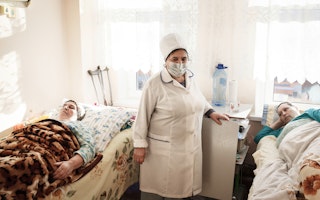Older People and the Right to Freedom from Suffering
By Tamar Ezer & Kiera Hepford
Older people are the most rapidly growing segment of the population worldwide. By 2050, the number of people over age 60 is expected to reach over 2 billion, exceeding the number of children. Eighty percent of this population will live in developing countries.
The human rights system has long ignored the plight of older people in the face of widespread abuse, including:
- exclusion from economic opportunities and denial of social benefits, condemning millions to poverty;
- deprivation of decision-making authority over medical care, personal finances, and property;
- inheritance laws forcing widows off their land and allowing relatives to seize their property;
- unavailability of needed health services by trained professionals, and mistreatment and denial for being too old;
- violence in institutional and long-term care facilities, and even in their own homes.
No human rights convention addresses the vulnerability of older people to abuse, and only one treaty—the convention on the rights of migrant workers—explicitly prohibits age discrimination. The current human rights framework contains gaps not just in norms, but also procedures for enforcement. Accountability for violations is virtually nonexistent. States rarely include older people in their reports to human rights bodies.
Out of 21,353 recommendations issued by the Human Rights Council during the first round of country reviews, a mere 31 recommendations address “elderly” people or people of “old age.” As UN Secretary General Ban Ki-moon recognized, “Existing human rights mechanisms have lacked a systemic and comprehensive approach to the specific circumstances of older men and women.”
Palliative care is one of the critical human rights repeatedly denied to older people.
Palliative care aims to improve the quality of life for patients and families facing life-threatening diseases by relieving pain and suffering through physical, spiritual, and psychosocial care. This includes legal support—empowering older people to make decisions about their finances, property, medical care, and planning for children under their care.
Palliative care is particularly relevant to older people, who bear a disproportionate burden of chronic, incurable illnesses including cancer, diabetes, heart failure, and dementia. Thus older people are more acutely affected by gaps in human rights standards and accountability.
Each year, 7.3 million people die in moderate to severe pain from cancer or HIV. Although low- and middle-income countries have the greatest disease burden and therefore the greatest suffering from pain, only 7 percent of the population can access opioids for pain relief in these countries.
Moreover, older people are routinely made invisible. Because few countries collect data on HIV infection, noncommunicable diseases, or violations of older people's rights—they are often excluded from needed public health programs.
But the situation is starting to change.
- In 2010, the UN General Assembly established the Open-Ended Working Group on Ageing. The working group’s mandate is to identify gaps in the protection of older people’s rights and recommendations to address them.
- In 2011, Navi Pillay, the High Commissioner for Human Rights, addressed the Human Rights Council’s panel on the right to health of older persons. “Adequate access to palliative care is essential to ensure that these people can live, and ultimately die, with dignity."
- In 2013, the African Commission drafted a new protocol on the rights of older people, and the Organization of American States is moving forward with an Inter-American convention focused on the rights of older people.
- And as we write, the Council of Europe is working on non-binding guidelines on the rights of older people.
In all these efforts, it is critical to provide support for both active aging—enabling older people to lead active lives and fully participate in society—as well as palliative care.
On this Human Rights Day, the rights of older people must no longer be ignored.
Until June 2016, Tamar Ezer was deputy director of the Law and Health Initiative of the Open Society Public Health Program.
Until September 2014, Kiera Hepford was a program officer with the Open Society Public Health Program.


